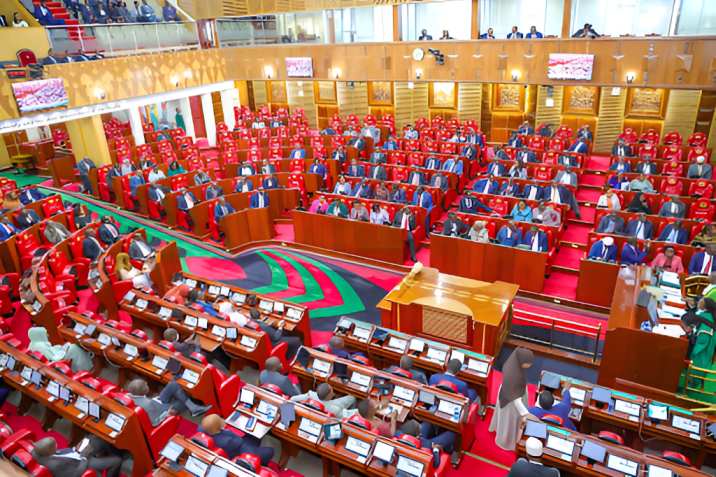MPs raise alarm over delayed justice as Judiciary cites budget gaps

Lawmakers expressed deep concern over what they termed as worsening delays in court processes, warning that public confidence in the justice system is eroding.
Access to justice in Kenya remains painfully slow, costly, and emotionally draining for many citizens, a concern that featured prominently during a meeting between the Judicial Service Commission (JSC) and the Constitutional Implementation Oversight Committee (CIOC) in Parliament.
Lawmakers expressed deep concern over what they termed as worsening delays in court processes, warning that public confidence in the justice system is eroding. They urged the judiciary to urgently improve case handling, speed up rulings, and take justice closer to the people.
“How is it that the earliest judgement one can expect takes 4 or 5 years?” asked Geoffrey Mulanya. “Kenyans are losing faith. Quick access to justice isn’t a luxury, it’s a constitutional right.”
The frustrations raised were not abstract but mirrored the everyday struggles experienced by ordinary Kenyans seeking legal redress. Charles Nguna questioned why people should be forced to travel long distances just to have their cases heard.
“Why should someone travel hundreds of kilometres just to be heard? We should have a functioning court in every constituency. Justice must be brought closer to the people,” he said.
Representing the Judicial Service Commission, Lady Justice Fatuma Sichale provided a detailed account of the scale of the problem. She disclosed that the judiciary is grappling with a backlog of over 257,000 cases, and that appeals typically take five years to conclude due to limited Court of Appeal benches.
“We’re sitting on a backlog of 257,000 cases,” she said. “With only nine Court of Appeal benches hearing all appeals in the country, the average lifespan of an appeal is about five years. We’re working on establishing 15 more benches, but the elephant in the room is funding.”
She explained that the JSC has partnered with MPs to construct prototype courts, with 14 already built through constituency-level collaboration. However, she pointed out that limited funding and insufficient personnel continue to hamper progress.
“Every sub-county needs a court. We’re embracing partnerships to make that happen,” said Judge Sichale. “But to function, these courts need more personnel and equipment. The budget allocation, less than 1% of the national budget, is not enough.”
MPs also pointed to other concerns, including intentional delays, lack of transparency, and questionable case transfers that they believe contribute to public mistrust.
“Intentional delays, questionable transfers of cases, and a lack of transparency fuel the perception that justice is compromised,” said Caroli Omondi. “We need a clear case management policy, judicial performance statistics, and greater accountability. This isn’t just about courts, it’s about the trust of the Kenyan people.”
Mulanya went further, questioning legal practices that appear to disadvantage ordinary citizens.
“Why should a case be filed in Kisumu when the complainant lives in Nairobi? Kenyans are frustrated. Succession matters remain inaccessible. We need a policy, urgently.”
The Chief Registrar of the Judiciary echoed the need for urgent reform, saying the JSC’s powers are limited when it comes to disciplining judges and addressing minor infractions.
“The JSC can only recommend the removal of a judge. We can’t issue sanctions or address minor infractions. Even proposed legislation from JSC remains pending,” she said. “There’s also a friction in appointments due to tensions between arms of government.”
Despite the stark realities laid bare during the session, lawmakers and judiciary representatives agreed that change is not optional. Both sides called for increased funding, legislative clarity, and institutional cooperation to restore the justice system's credibility.
As Caroli Omondi summed it up, “Justice that takes years is justice denied. Let’s fix the system, not just patch it.”
Separately, Attorney General Dorcas Oduor in February announced a new push to resolve corruption cases more swiftly, underlining the urgency for reforms. Speaking at the launch of the Kenya Integrity Plan (KIP) at the Kenyatta International Convention Centre, she revealed that the government is working on the Anti-Corruption Law Amendment Bill, 2025, which aims to conclude all corruption and economic crimes within six months of filing.
"We have developed the Anti-Corruption Law, Amendment Bill 2025, which seeks to, among other things, have corruption and economic crimes concluded within six months after commencement and lessen the time taken to appeal at the High Court and the Court of Appeal," she stated.
"If the amendment goes through, then all corruption cases will have to be concluded within this timeframe," the AG said.
She urged state institutions to embrace accountability and adopt modern investigation methods.
"We have done much in the fight against corruption, but in 2025, we still face economic challenges tied to graft. If the proposed amendments go through, all anti-corruption cases will have to be concluded within this timeframe," she said.
